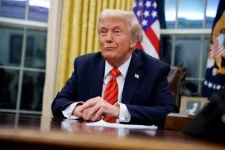Zimbabwe faces possible travel limits for its people heading to America. Reports said Friday that the US might block visitors from 41 nations because they threaten security and safety. Staff members working for President Donald Trump shared an inside paper that sorts countries by danger level. The plan splits nations into red, orange, and yellow groups based on risk.
Anyone from the eleven red-marked countries cannot enter America at all. These include Afghanistan, Bhutan, Cuba, Iran, Libya, North Korea, Somalia, Sudan, Syria, Venezuela, and Yemen. The State Department created this list, but officials may change it before final approval happens. Orange group nations face harder rules for people moving to America, tourists, and students with some cases allowed.
Belarus, Eritrea, Haiti, Laos, Myanmar, Pakistan, Russia, Sierra Leone, South Sudan, and Turkmenistan all fall under orange status. Zimbabwe is in the yellow group with many African nations. Yellow countries must fix problems America points out within 60 days, or they move up to stricter levels. The list includes Angola, Antigua and Barbuda, Benin, Burkina Faso, and many others.
Trump has not discussed this paper openly yet. His January 20 order aimed to protect Americans from "aliens who want to attack, harm security, spread hate, or abuse immigration laws." The order asked cabinet members to suggest which countries should face travel limits. When asked which nations might appear on a new list, Trump refused to provide details, saying it would be "stupid" to share.
Trump promised during his campaign to bring back travel bans like he did before. Just seven days after taking office in January 2017, he blocked Syrian refugees and temporarily stopped people from Iraq, Iran, Libya, Somalia, Sudan, and Yemen. His action caused airport confusion and protests across America as critics called it a "Muslim ban." Judges quickly blocked this first version because it discriminated against these countries.
The Supreme Court later allowed a changed version that still limited travel from Iran, Libya, North Korea, Somalia, Syria, Venezuela, and Yemen. The Court supported this ban in 2018. President Joe Biden canceled the travel ban when he took office in 2021. He called it "a stain on our national conscience" that went against the American tradition of welcoming people of all beliefs.
Anyone from the eleven red-marked countries cannot enter America at all. These include Afghanistan, Bhutan, Cuba, Iran, Libya, North Korea, Somalia, Sudan, Syria, Venezuela, and Yemen. The State Department created this list, but officials may change it before final approval happens. Orange group nations face harder rules for people moving to America, tourists, and students with some cases allowed.
Belarus, Eritrea, Haiti, Laos, Myanmar, Pakistan, Russia, Sierra Leone, South Sudan, and Turkmenistan all fall under orange status. Zimbabwe is in the yellow group with many African nations. Yellow countries must fix problems America points out within 60 days, or they move up to stricter levels. The list includes Angola, Antigua and Barbuda, Benin, Burkina Faso, and many others.
Trump has not discussed this paper openly yet. His January 20 order aimed to protect Americans from "aliens who want to attack, harm security, spread hate, or abuse immigration laws." The order asked cabinet members to suggest which countries should face travel limits. When asked which nations might appear on a new list, Trump refused to provide details, saying it would be "stupid" to share.
Trump promised during his campaign to bring back travel bans like he did before. Just seven days after taking office in January 2017, he blocked Syrian refugees and temporarily stopped people from Iraq, Iran, Libya, Somalia, Sudan, and Yemen. His action caused airport confusion and protests across America as critics called it a "Muslim ban." Judges quickly blocked this first version because it discriminated against these countries.
The Supreme Court later allowed a changed version that still limited travel from Iran, Libya, North Korea, Somalia, Syria, Venezuela, and Yemen. The Court supported this ban in 2018. President Joe Biden canceled the travel ban when he took office in 2021. He called it "a stain on our national conscience" that went against the American tradition of welcoming people of all beliefs.












